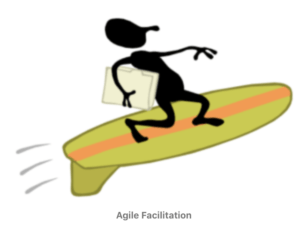We love Agile and an Agile mindset. You should too.
For most of you, some version of Agile methodology will replace or at least substitute for waterfall SDLC (software development life-cycle) and PDLC (product development life-cycle). For many of you, it already has. ‘Agile’ and ‘facilitation’ are terms so intertwined, that they are nearly redundant and remarkably powerful.
An Agile mindset compelled us to become Registered Educational Providers through the Scrum Alliance. Therefore, alumni of our MGRUSH workshops may now receive up to 40 SEUs (Scrum Educational Units). Here’s why.
- Roles, artifacts, and ceremonies align wholeheartedly with our instruction about meeting consciousness (understanding responsibilities), competence (managing artifacts), and confidence (facilitating events).
- Both Agile and MGRUSH structured facilitation stress the importance of rapid planning. We call it the WHY before the WHAT before the HOW. Agile notes three levels of planning sessions, for Agile teams. Therefore, we roughly approximate below with traditional Business Planning. With the conviction that “Individuals and interactions over processes and tools” (Agile Manifesto, 2001), consensual planning becomes essential.
Facilitation Planning Sessions
| Business Planning | Agile Rapid Planning |
| Strategy | Release |
| Portfolio | Sprint |
| Product | Daily |
- The increasing resolution behind different levels of ‘requirements’ speaks loudly to the MGRUSH preference, to start broad and work narrow. Prioritization Tools in MGRUSH have long promoted CRUD, MoSCoW, Story Sizing and other recommended Agile steps. Additionally, we recommend building user stories using the MGRUSH Purpose Tool, whereby . . .
. . . important because . . . so that . . .
- Agile supports stress-tested workshops such as Release Planning agendas that virtually ensure success. Meetings, even Daily Scrums, embrace rules to ensure that everyone gets done faster. Remember, you don’t have to have rules. However, without structure the terms ‘discussion’, ‘percussion’, and ‘concussion’ remain closely related.
- Life cycle meetings such as a Design Review encourage the participation of necessary roles, without the redundancy of too many people (7 plus or minus 2) or the gap of missing stakeholders. Retrospectives follow our established Content Management tool with the three-question method leading to changes for the next sprint or release.
- Significant meetings such as Planning, Design Review, Pre-Planning, Final UAT, and Iteration Retrospectives are structured by clearly defined deliverables from each step in the agenda. We love that because it is easy to lead when you know where you are going. Perhaps most importantly the Agile Community understands the importance of operational definitions. Critical terms such as “DONE” are clearly defined and not subject to non-productive arguments.
- Finally, Agile facilitation encourages scenario development and visual support to galvanize consensus. Process or Activity Diagrams, Wireframes, Mockups, Clear Criteria, and Specifications by Example are all encouraged, if not mandated. Love it.
______
Don’t ruin your career by hosting bad meetings. Sign up for a workshop or send this to someone who should. MGRUSH workshops focus on meeting design and practice. Each person practices tools, methods, and activities daily during the week. Therefore, while some call this immersion, we call it the road to building high-value facilitation skills.
Our workshops also provide a superb way to earn up to 40 SEUs from the Scrum Alliance, 40 CDUs from IIBA, 40 Continuous Learning Points (CLPs) based on Federal Acquisition Certification Continuous Professional Learning Requirements using Training and Education activities, 40 Professional Development Units (PDUs) from SAVE International, as well as 4.0 CEUs for other professions. (See workshop and Reference Manual descriptions for details.)
Want a free 10-minute break timer? Sign up for our once-monthly newsletter HERE and receive a free timer along with four other of our favorite facilitation tools.

Terrence Metz, president of MG RUSH Facilitation Training, was just 22-years-old and working as a Sales Engineer at Honeywell when he recognized a widespread problem—most meetings were ineffective and poorly led, wasting both time and company resources. However, he also observed meetings that worked. What set them apart? A well-prepared leader who structured the session to ensure participants contributed meaningfully and achieved clear outcomes.
Throughout his career, Metz, who earned an MBA from Kellogg (Northwestern University) experienced and also trained in various facilitation techniques. In 2004, he purchased MG RUSH where he shifted his focus toward improving established meeting designs and building a curriculum that would teach others how to lead, facilitate, and structure meetings that drive results. His expertise in training world-class facilitators led to the 2020 publication of Meetings That Get Results: A Guide to Building Better Meetings, a comprehensive resource on effectively building consensus.
Grounded in the principle that “nobody is smarter than everybody,” the book details the why, what, and how of building consensus when making decisions, planning, and solving problems. Along with a Participant’s Guide and supplemental workshops, it supports learning from foundational awareness to professional certification.
Metz’s first book, Change or Die: A Business Process Improvement Manual, tackled the challenges of process optimization. His upcoming book, Catalyst: Facilitating Innovation, focuses on meetings and workshops that don’t simply end when time runs out but conclude with actionable next steps and clear assignments—ensuring progress beyond discussions and ideas.




